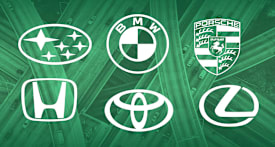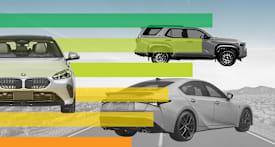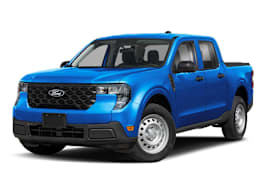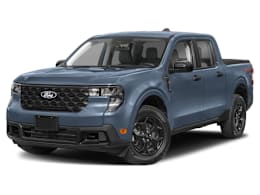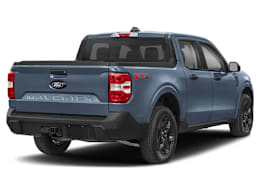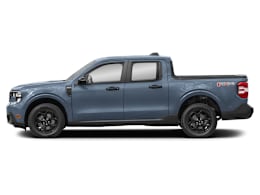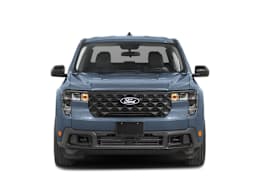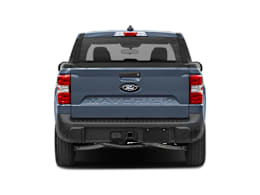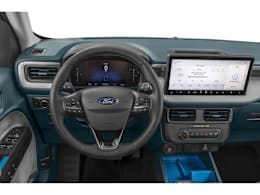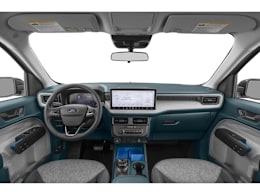The Maverick is a small pickup based on Ford’s Bronco Sport and Escape SUVs. It occupies an increasingly popular niche—a small truck that can be bought on a budget. With a civilized ride, handy maneuverability, easy access, and decent fuel efficiency, the Maverick outscores every pickup in its class, other than the larger and more expensive Honda Ridgeline.
It is better-suited to most “truck stuff”—whether for work or play—than the similarly-sized Hyundai Santa Cruz. For instance, the Ford’s 4.5-foot-long bed has about one-and-a-half times the volume of the little Hyundai’s, and the bed’s low height makes it easy to load. The tailgate can be positioned at an upward angle which, in conjunction with the tops of the rear wheel wells and ratchet straps, makes it possible to carry standard 4x8 sheets of plywood. Owners are also likely to appreciate the handy sliding tie-down rings and in-bed lighting. One “truck stuff” area where the Santa Cruz is superior is towing: When properly equipped the Hyundai has the ability to tow a trailer of up to 5,000 pounds, whereas the Ford is limited to 4,000 pounds.
The Maverick’s standard powertrain is a 250-hp, 2.0-liter turbocharged four-cylinder that comes mated to an eight-speed automatic transmission. The engine is well-matched to the Maverick’s weight, with just-robust-enough power for most driving situations, though it can sound wheezy and uninspiring. Its 0 to 60 mph time of 7.1 seconds is competitive with other small-to-midsized trucks; it isn’t quite as quick as the speedy Santa Cruz, but it’s a hair quicker than the Ridgeline. Our tested all-wheel-drive model managed 23 mpg overall on regular fuel.
We also tested the optional 191-horsepower, 2.5-liter four-cylinder hybrid, which uses an electronically controlled continuously variable transmission (eCVT) and front-wheel drive. For 2025, all-wheel drive is available. The hybrid version that we tested can do most small truck workhorse tasks, but the powertrain registered 37 mpg overall in our tests, making it far more efficient than any other pickup. It’s not as quick as the turbo model, but the electric motor gives smooth and robust response at low speeds, and we like that the hybrid eliminates the turbo model’s annoying engine vibrations.
The ride is firm, but it’s less unruly when driving on bumpy roads than most pickups. With different tires and weight distribution, the hybrid model felt more steady and composed and without the quick, short pitches that we found on the turbo AWD version. And although the Maverick doesn’t turn into corners with quite the verve of the Santa Cruz, it proved utterly secure and confidence-inspiring around our test track. The compact dimensions make it adept in parking maneuvers and outward visibility is quite good. It also turned in short, consistent stopping distances.
Refinement was clearly not a high priority for the Maverick. It can get pretty loud inside the cabin, due to a combination of engine and wind noise, especially on the highway. The engine’s tendency to lug along at low revs can send uncouth vibrations into the cabin, which gets annoying. The hybrid model is noticeably quieter. The utilitarian interior is full of cheap-feeling plastic pieces, which isn’t surprising given its price. The controls are relatively simple to use.
Unlike most pickups, it’s easy to get in and out of the Maverick due to its low floor height. The front seatbacks are well-bolstered, but thigh support is lacking. Available only as a crew cab, the rear seat has plenty of headroom, but legroom is tight for taller passengers, and the upright seatback can get uncomfortable on long trips.
Forward collision warning, automatic emergency braking with pedestrian detection, lane departure warning, and lane keeping assistance come standard, but important active safety features such as blind spot warning and rear cross traffic warning are optional on XL and XLT trims. Lariat, Tremor, and Lobo trims receive all of the aforementioned safety features, along with adaptive cruise control and lane centering assistance, as part of the standard Co-Pilot 360 Assist 2.0 system.
